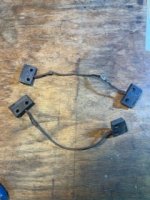For brushes: contact Helwig Carbon. Helwig is a carbon brush manufacturer, and they have a very large selection of stock brushes. If not, they will make up brushes to whatever size and application is needed. Different applications require different carbon densities, aside from the dimensions and shape of the brush. Be prepared to give them the nameplate data on the motor, as well as any dimensions you can get off the original brushes. If possible, take accurate measurements of the inside of the brush holders. We used Helwig for many years to furnish brushes for large powerplant generators, and I've used them to supply brushes for rare/obsolete DC locomotive traction motors, as well as for a large WWI era repulsion-induction motor in my own shop.
from the OP's post, it is unclear if the motor conked out while running the compressor, or failed to start after being shut down. From my own experience, when an R-I motor of this type does not start and hums, the problem is usually in the brushes. Sometimes, the brushes are sticking in the brush holders and not making good contact with the commutator. Worn brushes as well as weakened brush holder springs, as per Ramsay1's post, also will cause this. Some brush holders will have an adjustment to set the spring loading on the brushes. I had one 3 HP R-I motor that hummed and did not start turning. I'd give that motor a manual spin of the shaft before closing the switch on it. It would then wind up. The arcing and sounds coming from that motor when it wound up were about like an old NYC elevated subway train on a rainy night. I contacted Helwig, and talked to one of their engineers. He took the dimensions (or I may have mailed them a sketch, it's been about 30 years), and they made me a set of brushes of correct dimensions, and with the braided copper pigtails of correct size/type. Cleaned the brush holders well, used a commutator stone (do NOT use emery cloth) on the rotor where the brushes rode, and put in the new Helwig brushes. Never had another problem with that motor.




